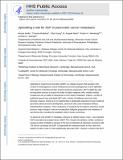Upholding a role for EMT in pancreatic cancer metastasis
Author(s)
Aiello, Nicole M.; Brabletz, Thomas; Kang, Yibin; Nieto, Maria; Weinberg, Robert A; Stanger, Ben Z.; ... Show more Show less
Downloadnihms941748.pdf (547.9Kb)
OPEN_ACCESS_POLICY
Open Access Policy
Creative Commons Attribution-Noncommercial-Share Alike
Terms of use
Metadata
Show full item recordAbstract
Epithelial-to-mesenchymal transition (EMT) is a cellular program that operates in the context of embryogenesis, wound healing and carcinoma pathogenesis to drive epithelial cells towards a mesenchymal state. During carcinoma progression, EMT enables the cells forming these tumours to acquire the traits of highly malignant cells, notably motility, invasiveness and an ability to disseminate to form distant metastases. Indeed, a number of published reports have associated EMT with a variety of malignant carcinoma cells. Recently, however, Zheng et al.1 reported that in genetically engineered mouse models of pancreatic adenocarcinoma development, carcinoma cells could metastasize without activating EMT programs. Their conclusions, if sustained by the evidence presented, would prompt a major change in how we conceptualize malignant progression and metastasis of carcinoma cells, including the neoplastic cells in human carcinomas.
Date issued
2017-07Department
Broad Institute of MIT and Harvard; Massachusetts Institute of Technology. Department of BiologyJournal
Nature
Publisher
Springer Nature
Citation
Aiello, Nicole M., Thomas Brabletz, Yibin Kang, M. Angela Nieto, Robert A. Weinberg, and Ben Z. Stanger. “Upholding a Role for EMT in Pancreatic Cancer Metastasis.” Nature 547, no. 7661 (July 5, 2017): E7–E8.
Version: Author's final manuscript
ISSN
0028-0836
1476-4687